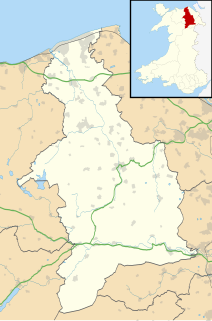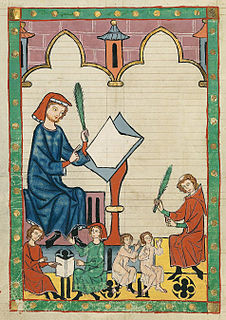
William Morgan was Bishop of Llandaff and of St Asaph, and the translator of the first version of the whole Bible into Welsh from Greek and Hebrew.

John Williams was a Welsh clergyman and political advisor to King James I. He served as Bishop of Lincoln 1621–1641, Lord Keeper of the Great Seal 1621–1625, and Archbishop of York 1641–1646. He was the last bishop to serve as lord chancellor.

Bible translations into Welsh have existed since at least the 15th century, but the most widely used translation of the Bible into Welsh for several centuries was the 1588 translation by William Morgan, Y Beibl cyssegr-lan sef Yr Hen Destament, a'r Newydd as revised in 1620. The Beibl Cymraeg Newydd was published in 1988 and revised in 2004. Beibl.net is a new translation in colloquial Welsh which was recently completed.

Daniel Silvan Evans was a Welsh clergyman, scholar and lexicographer. Educated at the Independent College in Brecon, Silvan Evans worked as a schoolmaster for five years. On marriage he conformed to the Established Church, studying at St David's College, Lampeter, where he became Lecturer in Welsh. Ordained deacon in 1848 and priest the following year he served curacies at Llandegwning parish in Llŷn and from 1852 to 1862 at nearby Llangian, Caernarfonshire. In 1862 he was appointed to the living of Llanymawddwy, Merioneth.
Thomas Williams may refer to:
Thomas Bowles was a Church of England priest. He is notable for a controversy in which he was appointed to two parishes in Wales where hardly any parishioners spoke English, despite the fact that Bowles spoke no Welsh. Bowles was a grandfather of the priest and poet William Lisle Bowles (1762–1850).
This article is about the particular significance of the century 1601 - 1700 to Wales and its people.
Edward Edwards was a Welsh scholar and clergyman. He was a Fellow of Jesus College, Oxford for over thirty-five years, and was Vice-Principal for more than twenty years. His particular scholastic interest was in the works of the Greek philosopher Xenophon.
Philip Constable Ellis was a Welsh Anglican priest in the Anglo-Catholic tradition and one of the earliest Tractarians in north Wales.

Rowland Williams was a Welsh Anglican priest and writer.
John Hugh Jones was a Welsh Roman Catholic priest, translator and tutor.
Edward James was a Welsh Anglican priest and translator.
Peter Bayley Williams was a Welsh Anglican priest and amateur antiquarian. It is also claimed that he led the first rock climb recorded in the United Kingdom.
Hugh Williams was a Welsh Anglican priest and writer.
Edmund (Edmwnd) Prys was a Welsh clergyman and poet, best known for Welsh metrical translations of the Psalms in his Salmau Cân.
Richard Williams Morgan (c.1815-1889) was a Welsh Oriental Orthodox priest and author.

St Tyfrydog's Church, Llandyfrydog is a small medieval church, in Llandyfrydog, Anglesey, north Wales. The date of establishment of a church on this site is unknown, but one 19th-century Anglesey historian says that it was about 450. The oldest parts of the present building are dated to about 1400, with the chancel dating from the late 15th or early 16th century. It is built from rough, small, squared stones, dressed with limestone. One of the windows on the south side is raised to illuminate the pulpit, a decision that in the eyes of one 19th-century commentator "disfigures the building."

St Beuno's Church, Trefdraeth is the medieval parish church of Trefdraeth, a hamlet in Anglesey, north Wales. Although one 19th-century historian recorded that the first church on this location was reportedly established in about 616, no part of any 7th-century structure survives; the oldest parts of the present building date are from the 13th century. Alterations were made in subsequent centuries, but few of them during the 19th century, a time when many other churches in Anglesey were rebuilt or were restored.
This article is about the particular significance of the year 1726 to Wales and its people.














